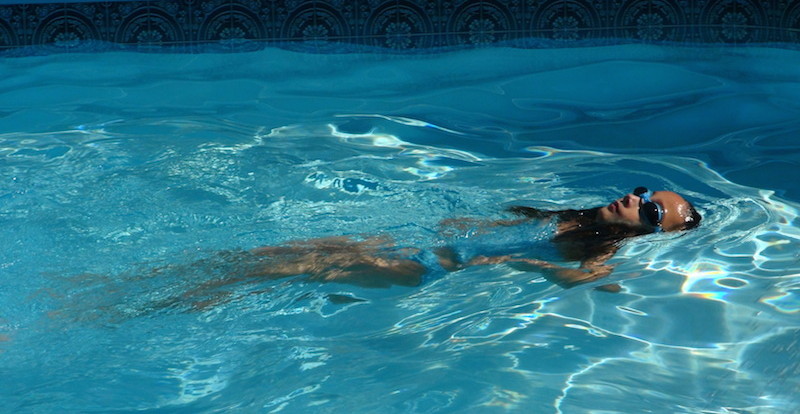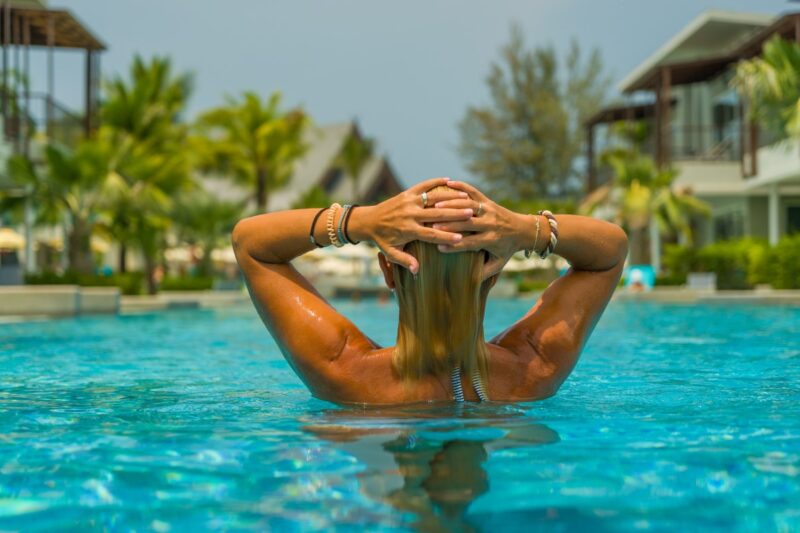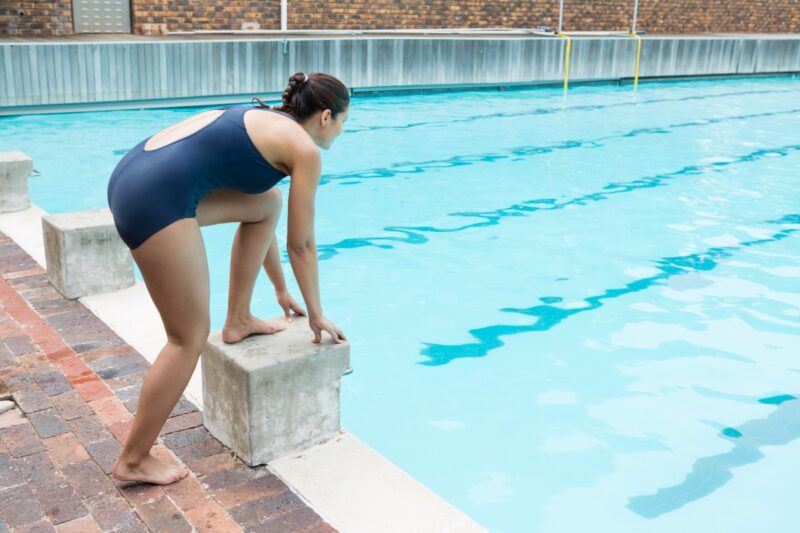
If you love to swim in the pool, chlorine, bromine, salt and other chemicals can be harsh on your skin, hair and swim gear. Constant exposure to pool water starts to break down the material of your swim gear. It also deprives your skin and hair of its natural oils. Chlorine can trigger allergies, rashes or sinus problems for those with sensitive skin.
There are multiple steps to protecting your skin from pool chemicals. Follow these tips before and after you go for a swim to keep your skin soft and smooth!
How To Protect Skin from Pool Chemicals
Pre-Swim: Take a quick rinse before swimming, or apply sunscreen or lotions!
Protecting the skin against chlorine, bromine and other pool chemicals depends on individual sensitivity. This can vary from person to person for various reasons. Generally, always rinse in cool water before entering the swimming pool to minimize the absorption of chlorine. For those who suffer severe effects, protecting your skin a little more can help!
The best products to use depending on where you are swimming. Indoor and outdoor pools have some key differences.
- Outdoor Pools: Sunscreens for children should use non-irritating ingredients such as zinc oxide or titanium dioxide. These are the most effective at protecting skin from sun damage. It also provides extra protection against pool water.
- Indoor Pools: DermaSwim Pro is a pre-swimming lotion designed to protect sensitive skin against pool water chemicals.
Apply a lotion of your choice to prevent excess buildup of oils in swimming pools. After waiting a minute, take a quick shower before hopping in the water.
Post-Swim: Rinse with vitamin C after swimming!
Chlorine is a chemical that bonds to your skin and hair. This makes it hard for water to remove it. This is why we carry the smell of chlorine after swimming. Vitamin C is proven to neutralize chlorine from bonding to hair and skin!
- Create a topical spray by mixing one teaspoon (5g) of Vitamin C powder or crystals into about 500ml of water. Vitamin C crystals are available at Trader Joe’s and most health and wellness stores.
- Another option is purchasing pre-made ones! Swimspray is a common go-to Vitamin C rinse and is sprayed onto the hair and skin before using regular shampoo.
Post-Swim: Use a moisturizing lotion with antioxidants after swimming.
Chlorine, bromine and salt are just a few of the irritants that can affect our skin. Water removes the layer of oil from our skin that allows dryness to occur.
- Fully moisturize after each swim with vitamin-infused moisturizers such as Neutrogena Naturals Multi-Vitamin Nourishing Moisturizer or The Body Shop’s Body Butters
- Coconut oil and Baby oil can be found at most health and wellness stores. They are also great ways to moisturize the skin.
- The last way to replenish is fairly straightforward. Hydrate by drinking lots of water after swimming.
How To Protect Hair from Pool Chemicals
Pre-Swim: Wet hair with cool tap water before swimming, OR use pre-swim hair products!
Hair is porous and absorbs easily. An easy way to protect hair from chlorine, bromine, and salt is to rinse it with cool tap water, making it less likely to soak up the chlorinated pool water.
- Pre-swim conditioning shampoos such as Ultraswim keep hair healthy while swimming.
- Coating your hair with olive oil, baby oil or coconut oil before putting on a swim cap also does a good job of protecting it from chlorinated water!
Post-Swim Treatment: Rinse your hair immediately!
- Use a shampoo that chlorine from bonding and strips it from your hair. Use chlorine neutralizers like Swimspray alongside your regular shampoo and conditioner.
- After showering, use your hairdryer on its lowest setting to avoid drying your hair out even more.
How To Protect Swim Gear from Pool Chemicals
Your bathing suit is the one thing you never want to forget when it’s time for a dip in the pool. So taking good care of it is important as well. Follow these tips about how to get the most life you can out of your swimsuit!
Pre-Purchase: Check the tags before you buy!
- Swimsuits are made with many different materials. Polyester is the most durable and chlorine resistant. This is in comparison to nylon and spandex suits. It’s important to look for chlorine-resistant and fade-resistant fabrics if you want a swimsuit that lasts.
Pre-Swim: Rinse your swimsuit before swimming in cool water!
- Warm water has harsh effects on your swim gear. Remember to rinse it in cold water. Much like hair, wetting your swimsuit before hopping in the pool protects it. This also stops it from absorbing too much chlorinated pool water.
While swimming: Pay attention to where you sit!
- Poolside surfaces and decks might be too rough for swimsuit material. Avoid wear and tear by sitting in areas that won’t rip your beautiful new suit.
Post-Swim: Hand-wash your swimming suit in cold water and air dry!
The cold water removes the majority of chlorine or salt before it can permanently damage the suit.
Do not use bleach or the washing machine! This will ruin the colour and damage your swim gear.
Use specialty detergents for swimsuits to help them last a little longer. This improves your gear’s durability.
- The ZERO detergents by Woolite are perfect for washing your swimsuit.
- Solutions are simple ingredients that can be found in your home. Baking soda can remove sunscreen stains. Let your swimsuit sit in a baking soda water mix 1-2 hours before washing.
- Another solution is adding a few tablespoons of vinegar when washing to neutralize chlorine.
- Keep your swimsuit out of the sun and give it a whole day to dry and gain its original shape before wearing it again! This also stops bacteria and mildew from growing in the fabric.
If you follow our advice, you will be able to swim without worrying about chemicals damaging your hair, skin or swim gear!




